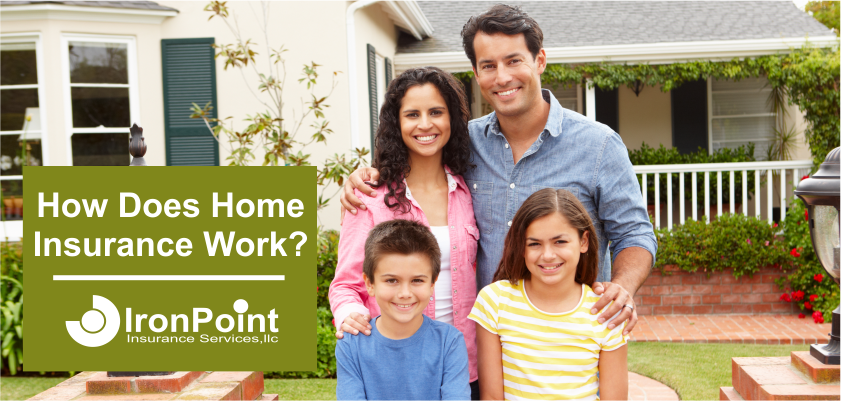When you buy a home your lender makes having homeowners insurance a condition of your mortgage. So you buy it. But do you really know how much home insurance you’ll need, or how much it will cost? Even after you get answers to those two questions, you’re still probably wondering how home insurance works.
Home insurance claims do happen, so understanding your homeowner’s policy is a good idea. The part of your home policy that you probably already know is that it protects you against unexpected expenses to repair or replace your home. But it offers more protection than that. It will also repair or replace unattached structures and personal property. Your home insurance policy can also cover injuries or damages you’re personally liable for as well as pay for certain living expenses if you’re unable to stay in your home while it’s being repaired or rebuilt due to a covered claim.
If an incident is covered by your home insurance, you have protection for your home, other structures on your property, your personal belongings, extra living expenses, and even your personal liability. That’s a pretty broad set of protections for your family.
Do you need homeowners insurance?
If you own your home, the answer is obvious – yes. Your home is likely one of your largest investments, so it deserves the proper protection from the unforeseen.
As we start to break down the protections and questions that may need answering, let’s first review the standard coverages included in just about every homeowner’s insurance policy and how they work.
The standard coverages:
| Coverage type | What it covers |
|---|
Dwelling | This coverage is for your home’s primary structure as well as the things that are permanently attached to the house, like attached garages, chimneys, roofs, countertops, cabinets, flooring, vanities, and in some cases your in-ground pool. |
Other structures | Other structures coverage refers to built structures that aren’t permanently attached to your home, like detached garages, gazebos, certain decks or patios, sheds, pergolas, fences, and driveways are protected in this coverage. |
Personal property | This coverage is for your personal possessions. This coverage pays to repair or replace things like clothing, furniture, and electronics. With most policies, this includes your possession when they are in your home or in your car, storage locker, and even with your while on vacation. |
Personal liability | If you or your family members cause injuries or property damage to others, this coverage pays for the claimed damages if you’re liable. It will also pay for certain related attorney and court costs. |
Loss of use | If you are displaced from your home for a covered loss, this will pay for daily expenses beyond your normal living costs while you’re unable to live in your home. |
What perils are covered in a homeowners insurance policy?
Perils are the things that your home insurance policy identifies as acts or incidents that may result in property damage or loss to your home. Home policies are written to either “name” the perils it will insure against or simply cover them “all.” If you purchase a policy that names the perils, these are called “Named Perils” policies, policies that cover them all are called “all perils,” or “open perils” policies. Note, even with All or Open perils policies, there are still things excluded. Make sure you ask which perils are excluded from your coverage if buying an open or all-perils policy. Below are the most common perils you need to have covered by your home insurance policy:
- Wind or Windstorms
- Fire and/or smoke
- Lightning
- Hail
- Tornadoes
- Explosions (e.g., aerosol can or gas grill)
- Theft and vandalism
- Car/aircraft crashing into your home
- Falling trees or other objects
- Weight of snow, sleet, or ice
- Water damage (from leaking roofs, broken pipes, water heaters, washing machines, dishwashers, or other appliances, but not floods)
Learn more about the different perils.
What does homeowners insurance NOT cover?
Your homeowner’s insurance policy is not designed to cover all acts or incidents. Certain things are either beyond the scope of home insurance or are too difficult to set prices in conjunction with the common perils. As a result, your home policy will identify these acts or incidents and provide you with a list of coverage exclusions. Below are some of the common acts or incidents (“perils”) that are typically excluded from coverage:
How do I choose the right amount of coverage?
The amount of coverage needed is unique to the individual. Since many of the coverages are calculated off of your main dwelling coverage, your selection really depends on the home’s replacement cost value. Below are some recommendations on how to view the coverage amount you may need for your home policy:
| Coverage type | Recommended coverage amount |
|---|
Dwelling | The dwelling coverage is the primary coverage of the home policy and will be used to calculate many other coverages. The dwelling limit should always cover the cost to rebuild your home from the foundation up should it be destroyed in a covered loss. The insurance carrier quote platforms will help you calculate the rebuild costs, so make sure to properly account for the proper building materials and any unique features of your home. It’s important to note, the replacement cost is not the market value. Depending on your home’s market, the cost to rebuild could be higher, and is often time lower, than its market value. |
Personal property | The personal property limits are often calculated as a percent (%) of the dwelling coverage. Depending on the carrier it can be as high as 75% and is frequently set to 50%. Some carriers allow you to modify this limit. Therefore, if the percentage used calculates a limit that is lower than your total personal property assets, you can increase the limit. |
Liability | When selecting a liability limit, you need to first consider all your assets. Add together bank, brokerage, and retirement accounts, as well as the equity in your home or other investment properties to establish what is at risk. Most home insurers offer personal liability coverage limits of $100,000, $300,000, and $500,000. The cost of $500,000 isn’t much different from $300,000, so the value of buying up is usually very affordable. If you discover that you need more coverage than $500,000, a personal umbrella policy may be a good choice for you. |
Loss of use | Depending on the insurance company, you may discover this coverage calculated as a percent of the dwelling coverage, or as set as “actual loss sustained” for a set period of time. If calculated as a percentage, it is common to see coverage limits of 20% of your dwelling coverage amount. However, for example, Safeco may offer you 24 months of “actual loss sustained” as the loss of use limit. |
To learn more about how much home insurance coverage you need, you can check out our home insurance 101 content.
How much does home insurance cost?
The cost of your homeowner’s insurance is going to depend on the home’s replacement cost calculation. In this way, it is very unique to the person buying the policy. Your cost will also depend largely on where your home is located, and in which state. According to the Insurance Information Institute, the average cost of a single-family home insurance policy (HO-3) nationally was $1,211 in 2017. Our 2020 average home insurance cost is $1,127. However, there are some policies with premiums as low as $622 per year and as high as $5,900 (excluding high-valued home policies (HO-5). Other than location, the cost of your home insurance will depend on other factors, including your home’s type, roof condition, and any previous home insurance claims.
There are home insurance discounts and other ways for you to lower your home insurance premium. You might consider increasing your home insurance deductible and of course, bundling your home policy with auto insurance is one of the best ways to save money.
Still, have questions about homeowners insurance?
Is my homeowner’s insurance tax deductible?
Your home insurance premium is not a typical tax deduction. For this, however, we would recommend you consult your accountant as there are some exceptions that may allow a deduction. For instance, this may be allowable if you operate a home-based business.
Will my home insurance cover the theft of personal property from my car?
Generally speaking, your home insurance does cover theft of personal property, and this may also include possessions stolen out of your car. This may be different between insurance carriers, so you should consult your insurance agent to get more details. Also, it is important to note that your home insurance does not cover the theft of your car, even though this is an item of personal property. To cover your car from theft you need to purchase comprehensive coverage on your auto insurance policy.
What is the term for a home insurance policy?
Your home insurance is most commonly sold as an annual or 12-month policy. If you want to pay your premiums in monthly installments, most insurance carriers have payment options available. Also, each year, unless otherwise noticed by your insurance company, the policy will renew automatically.
How do I pay for my homeowner’s insurance policy?
When buying a home insurance policy, you will have options on how you pay. You can elect to pay the premiums yourself, or through an escrow account with your mortgage servicer. If your mortgage servicer will pay your home insurance premium on your behalf, you will need to designate this account on your policy so the insurance company knows it’s “mortgage paid.” If you prefer to pay your insurance premiums outside of your mortgage, your insurance company will offer a variety of payment options, including monthly and electronic preferences.
Are you a first-time home buyer?
I rent an investment home to others, do I need homeowners insurance?
While you do need to insure your property, a home insurance policy is not the proper coverage. If you have investment properties that you rent to tenants, you need to buy a dwelling fire or landlord insurance policy. This type of policy is designed to both protect your property and liability, but it also has unique coverages that account for lost rent, discrimination lawsuits, and other risks related to being a landlord.

